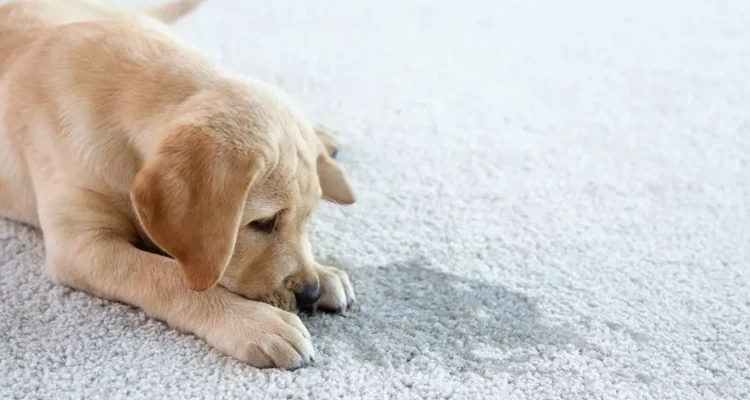Introduction
Have you ever noticed your dog’s pee smelling unusually strong or foul? You’re not alone. Understanding the reasons behind this can help you address potential health issues early and ensure your furry friend stays healthy and happy. Let’s dive into the possible causes and solutions for strong-smelling dog urine.

Common Causes of Strong-Smelling Dog Urine
Diet and Hydration
High-Protein Diets
Dogs on high-protein diets often have more pungent urine. Protein metabolism produces more nitrogenous waste, which can make the urine smell stronger. If your dog’s diet is primarily protein, this could be the reason behind the odor.
Dehydration
Dehydration is another common cause. When your dog isn’t drinking enough water, their urine becomes more concentrated, leading to a stronger smell. Make sure your pup always has access to fresh water.
Urinary Tract Infections (UTIs)
Symptoms of UTIs
UTIs are a frequent cause of smelly urine in dogs. Symptoms include frequent urination, straining to urinate, and sometimes blood in the urine. The bacteria causing the infection can lead to a very strong odor.
Diagnosis and Treatment
A vet can diagnose a UTI through a urinalysis. Treatment typically involves antibiotics, and it’s essential to complete the entire course to prevent recurrence.
Kidney Disease
Early Signs of Kidney Issues
Kidney disease can cause your dog’s urine to smell bad. Early signs include increased thirst and urination, lethargy, and loss of appetite. Kidney disease affects the body’s ability to filter waste, leading to stronger-smelling urine.
Managing Kidney Disease
Managing kidney disease involves a special diet, medications, and regular vet check-ups. Early detection and treatment can significantly improve your dog’s quality of life.
Diabetes
Symptoms of Diabetes in Dogs
Diabetes can make your dog’s urine smell sweet or unusually pungent. Symptoms include excessive thirst, frequent urination, weight loss, and lethargy.
Treatment Options for Diabetic Dogs
Treatment involves insulin therapy, dietary changes, and regular monitoring of blood glucose levels. Managing diabetes effectively can help reduce urine odor.
Bladder Stones
Causes and Symptoms of Bladder Stones
Bladder stones can cause your dog’s urine to smell strong due to the presence of minerals and bacteria. Symptoms include difficulty urinating, blood in the urine, and frequent urination.
Treatment and Prevention
Treatment may involve surgical removal of the stones or dietary adjustments to dissolve them. Regular vet check-ups and a balanced diet can help prevent their formation.
Less Common Causes of Foul-Smelling Urine
Liver Disease
Signs of Liver Problems
Liver disease can cause a variety of symptoms, including a strong urine odor. Look for signs such as jaundice (yellowing of the skin and eyes), vomiting, and changes in appetite.
Treatment and Management
Treatment involves managing the underlying cause, which may include medication, dietary changes, and supportive care. Regular vet visits are crucial for monitoring liver health.
Medications and Supplements
Impact on Urine Odor
Certain medications and supplements can affect the smell of your dog’s urine. If your dog is on medication, check with your vet to see if this could be the cause.
Monitoring and Adjusting Medication
Monitoring your dog’s response to medication and adjusting the dosage or type as needed can help manage urine odor.
How to Identify the Cause of Your Dog’s Smelly Urine
Observing Your Dog’s Behavior
Changes in Drinking and Eating Habits
Notice any changes in your dog’s drinking and eating habits. Increased thirst or appetite loss can indicate underlying health issues affecting urine odor.
Noting Urination Frequency and Volume
Pay attention to how often and how much your dog urinates. Changes in frequency or volume can provide clues about their health.
Collecting a Urine Sample
Steps to Collecting a Sample at Home
To collect a urine sample, use a clean container and catch the urine midstream. Wear gloves and store the sample in a clean, airtight container until you can take it to the vet.
When to Visit the Vet
If your dog’s urine smells bad and shows other signs of illness, it’s time to visit the vet. Early diagnosis and treatment are key to addressing health issues.
Veterinary Tests and Diagnostics
Urinalysis
A urinalysis can identify infections, kidney issues, and other conditions affecting urine odor. It’s a simple yet powerful diagnostic tool.
Blood Tests and Imaging
Blood tests and imaging (like X-rays or ultrasounds) can provide more detailed information about your dog’s health and help pinpoint the cause of smelly urine.
Home Remedies and Preventive Measures
Ensuring Proper Hydration
Encouraging Water Intake
Encourage your dog to drink more water by providing fresh water regularly and adding wet food to their diet. Hydration is crucial for dilute urine and reducing odor.
Providing Fresh Water Regularly
Always ensure your dog has access to clean, fresh water. This simple step can make a big difference in urine odor.
Maintaining a Balanced Diet
Choosing the Right Dog Food
Choose high-quality dog food that meets your dog’s nutritional needs. Avoid high-protein diets unless recommended by your vet.
Avoiding High-Protein Diets
High-protein diets can contribute to strong-smelling urine. Consult your vet to determine the best diet for your dog’s specific needs.
Regular Veterinary Check-Ups
Frequency of Vet Visits
Regular vet visits are essential for maintaining your dog’s health. Aim for at least once a year, or more frequently if your dog has health issues.
Importance of Routine Health Screenings
Routine health screenings can catch potential problems early, making treatment more effective and lessening the impact on your dog’s health.
FAQs
Can certain foods make my dog’s urine smell worse?
Yes, certain foods, especially those high in protein, can make your dog’s urine smell stronger. It’s essential to provide a balanced diet tailored to your dog’s needs.
How can I tell if my dog has a UTI?
Signs of a UTI include frequent urination, straining to urinate, and sometimes blood in the urine. If you suspect a UTI, visit your vet for a diagnosis and treatment.
Is smelly urine always a sign of a serious health issue?
Not always. While smelly urine can indicate a health issue, it can also be due to diet or dehydration. It’s essential to observe other symptoms and consult your vet if you have concerns.
What can I do to improve my dog’s urine smell?
Ensure your dog is well-hydrated, provide a balanced diet, and maintain regular vet check-ups. Address any underlying health issues as recommended by your vet.
How often should I take my dog to the vet for check-ups?
Regular vet visits should be at least once a year, but more frequent visits may be necessary if your dog has health issues or is a senior pet.
Conclusion
Understanding why your dog’s pee smells so bad is crucial for their health and well-being. From diet and hydration to serious health conditions like UTIs and kidney disease, many factors can influence urine odor. Regular vet check-ups, proper hydration, and a balanced diet are key to preventing and addressing these issues. If you notice any changes in your dog’s urine smell or behavior, don’t hesitate to consult your vet.












Congratulation!